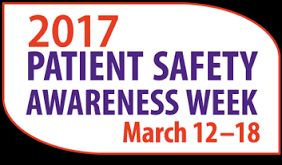Although patient safety affects each and every one of us, it’s not always a topic people dwell on. But nurses do and they will join the National Patient Safety Foundation (NPSF) in celebrating Patient Safety Awareness Week from March 12 to 18.
“Everyone is a patient and patient safety is a public health issue,” says Sara Valentin, CMP for NPSF, assistant vice president and program lead for Patient Safety Awareness Week. “But unless you are in the health care field or a patient or a family member of someone who has experienced medical harm in some capacity, you wouldn’t know about it.”
Patient Safety Awareness Week aims to educate and inform people about patient safety with tips for taking charge of your own health or for working in a health care setting. “Preventable medical harm is one of our top issues we focus on,” says Valentin. “Wouldn’t that be wonderful if that never happened again?”
One look at the news shows new systems and approaches have significantly reduced the instance of medical harm, but it still happens. “We have made progress, but we still have a lot to do,” says Valentin. “This is a good time to stop and pause and look at the work people have done.”
NPSF generally chooses a few topics to focus on during each annual Patient Safety Awareness Week and communication and medication safety are especially noted this year. And while there are lots of events to participate in and educational and practical tips to learn and share, Valentin says the NPSF also says a little levity helps keep the topic fresh. The organization is encouraging anyone to spread the word that “We are all patients” by posting photos of themselves in hospital gowns or in patient care settings using #WeAreAllPatients.
NPSF is celebrating National Patient Safety Week in many ways. They will host a Twitter chat (@theNPSF), “Patient Safety: What Patients Want (and Need) to Know,” on Tuesday, March 14, from 1 to 2 pm (ET). Use #psaw17chat to participate.
According to the NPSF website, a free webcast, “The Voice of the Patient and the Public,” is set for Wednesday, March 15, from 2 to 3 pm (ET) and includes several prominent panelists. Registration is required online at http://bit.ly/psawweb17.
According to Valentin, “Medication itself is a big topic.” NPSF plans to offer information, resources, and facts to help people protect themselves from medication errors and to make anyone handling medications aware of where things could go wrong.
Good communication is a significant deterrent to medical errors, but in the hectic health care world, it requires constant diligence from everyone. Patients can look at their relationships with health care providers as partnerships where they should ask questions and clarify instructions until they really understand what the final plan is.
Nurses can give their patients the time to ask questions. Even when it seems like you cannot squeeze one more minute out of the day, spending a few extra minutes to make sure a patient understands the proper medication, the correct dose, and instructions for taking it is essential. She says, “You can ask, ‘Do you have any more questions,’ or ‘Are you comfortable with what we have talked about?’” Some patients are especially easily overwhelmed in a medical setting and might not listen to each and every thing you are saying. Giving one last opportunity to clarify things can prevent mistakes.
And nurses can continually tweak their own processes. Nurses also need to listen to each other carefully to make sure they are both communicating and understanding everything that is needed and being said.
And while this one week will highlights the critical importance of avoiding errors, Valentin says nurses know it’s a 24/7 issue. “Every day is patient safety day,” she says. “This is a week to celebrate, but it’s something we work on every single day.”
- WOC Nurses Week Highlights Specialty - April 16, 2024
- Honoring Radiology Nurses Day on April 12 - April 12, 2024
- Travel Offers New Career Possibilities - April 8, 2024



